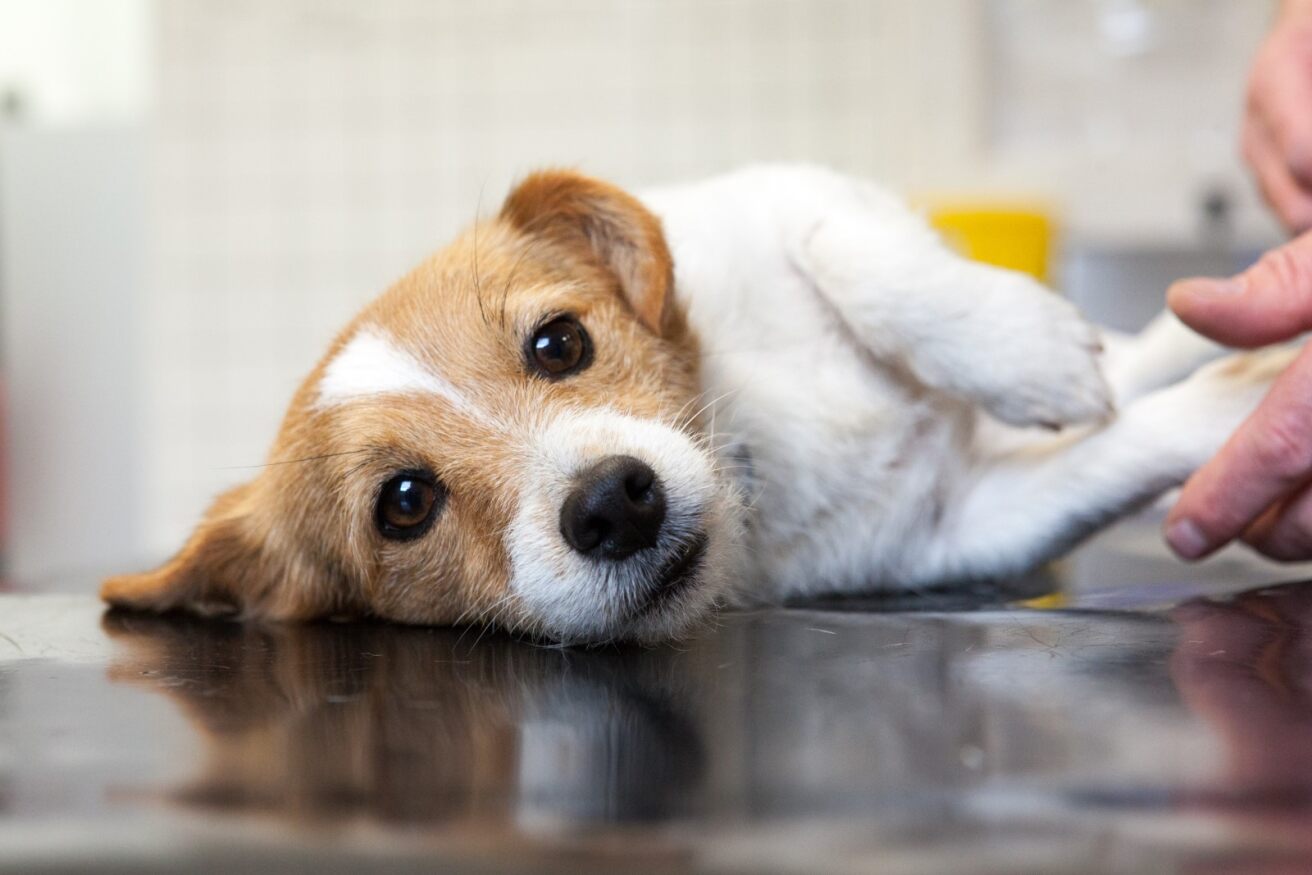Physiotherapy for pets
The physiotherapy service has an experienced team of veterinary physiotherapists, which is led by Laura Allmark, along with Jess Seeley, Charley Belachsen. Our qualified Veterinary Physiotherapists are movement and exercise specialists, with an in-depth knowledge of anatomy, biomechanics, pathology and physiology. Their expertise enables them to assess and treat injuries and diseases of the musculoskeletal system.
They offer a progressively dynamic, patient-centred service and are movement and exercise specialists, with an in-depth knowledge of anatomy, biomechanics, pathology and physiology. Their experience enables them to assess and treat injuries and diseases associated with muscles and joints.
Working closely with the clinical specialist teams our veterinary physiotherapists ensure your pet receives the care they need when they need it. Physiotherapy helps to enable the muscles and joints to move correctly and builds the correct muscles to keep it that way! This is achieved using a combination of manual techniques, electrotherapy and movement and exercise therapies.
Treatment aims to prevent problems occurring/reoccurring, promote good health and mobility and assist in effective and rapid recovery after surgery or injury.
There are many conditions which can benefit from veterinary physiotherapy:
Orthopaedics: Supporting and optimising the return of your pet’s limb function following surgery for conditions such as cruciate disease and elbow dysplasia, or following a traumatic injury. Physiotherapy is also sometimes used to conservatively manage orthopaedic conditions where surgery isn’t deemed appropriate such as hip dysplasia.
Neurology: Neurological conditions managed surgically or conservatively can benefit from physiotherapy to assist the return to function, for example following disc surgery.
Care of elderly pets: Caring for an elderly pet can be hard, but gentle physiotherapy and practical and easy guidance can help to make life more comfortable for your pet.
Pain management: The physiotherapy team works closely with our specialists in the Pain Clinic to help manage sudden onset and long-standing pain in pets.
Critical care: For the best possible outcome some of our patients are hospitalised for prolonged periods of time which can lead to secondary complications that are often associated with long periods of inactivity. Physiotherapy can assist with minimising these issues.
Medicine: Physiotherapy can help to maintain function during acute medical illness such as assisting in the treatment and management of respiratory conditions.
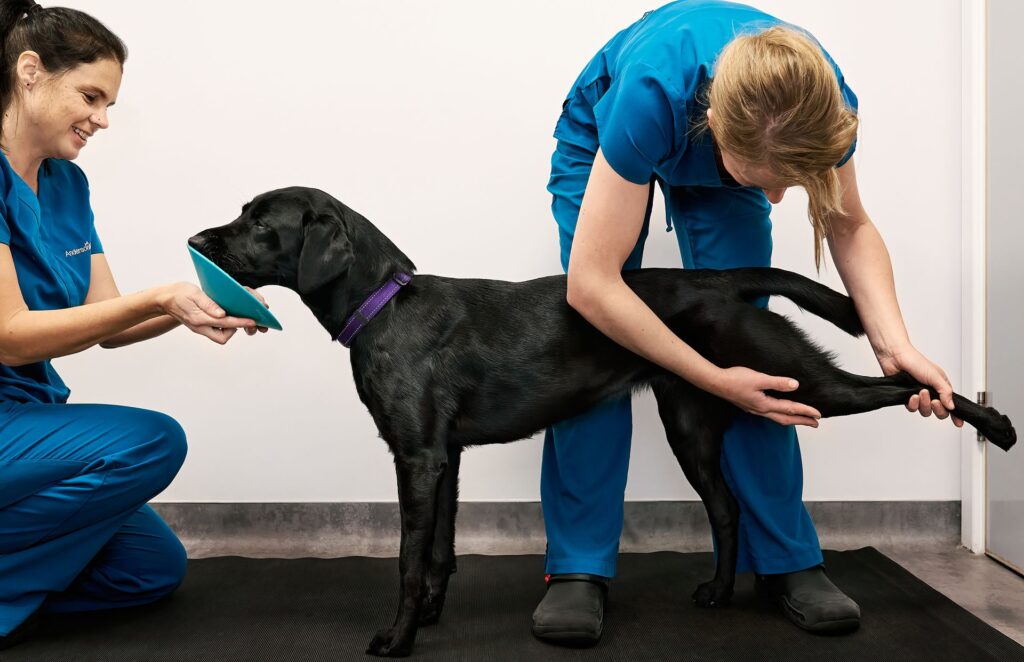
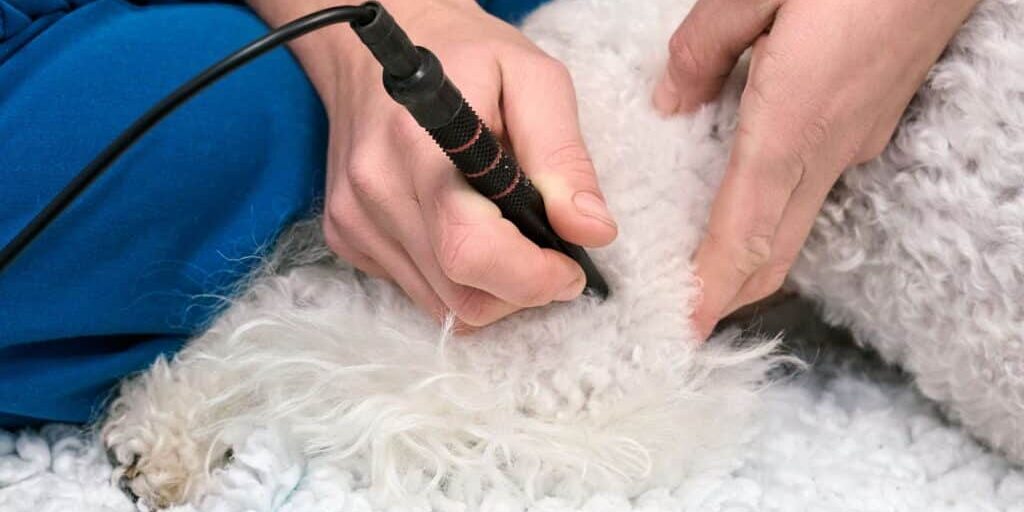
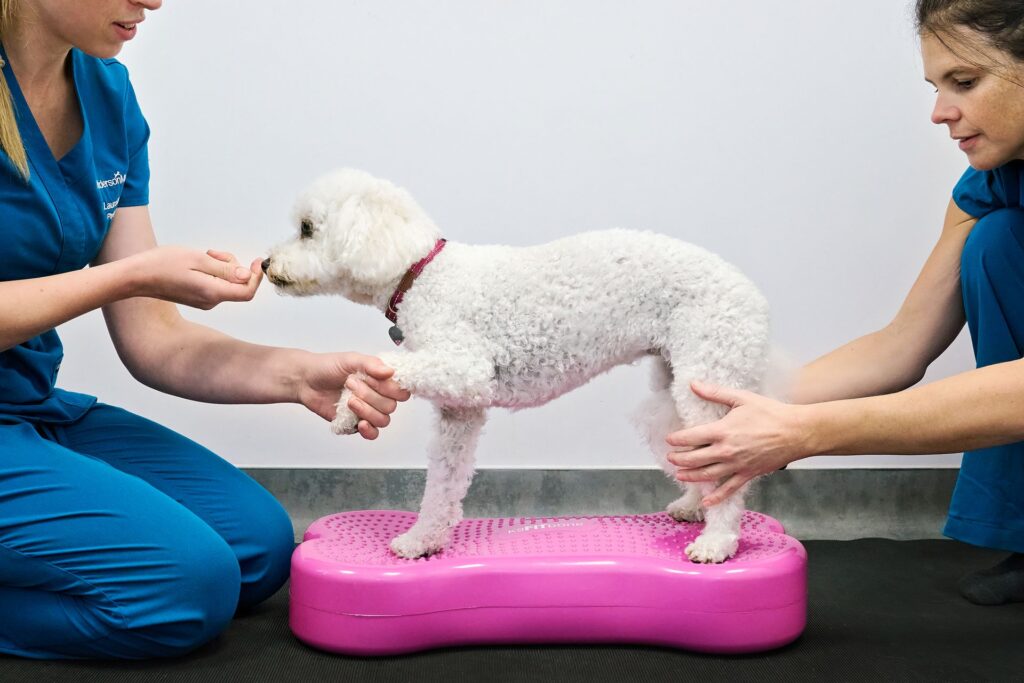
The physiotherapy team provide care for many of the pets that are being treated by us as inpatients, and they are often the faces you will see when you pick your pet up.
Pets are often discharged with a home care plan with specific, tailored advice on their care along with a home exercise programme.
We also have an outpatient clinic, where the team monitor your pet’s progress and provide ongoing advice and support. They also see new patients with mild hip or elbow dysplasia, soft tissue injuries or osteoarthritis, or in association with our Pain Clinic/acupuncture sessions.
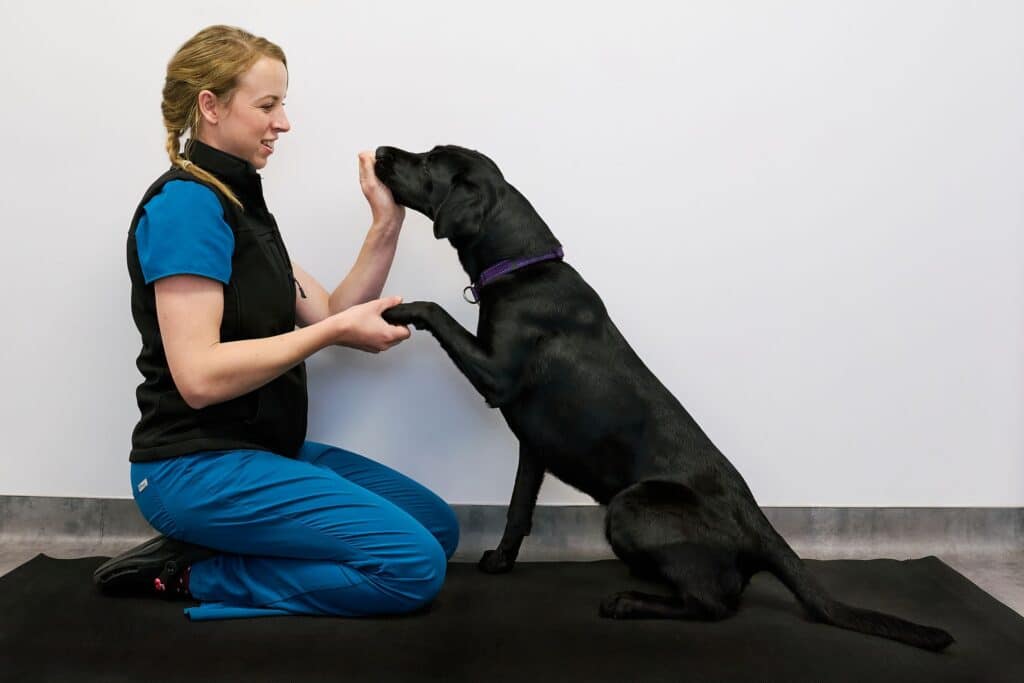
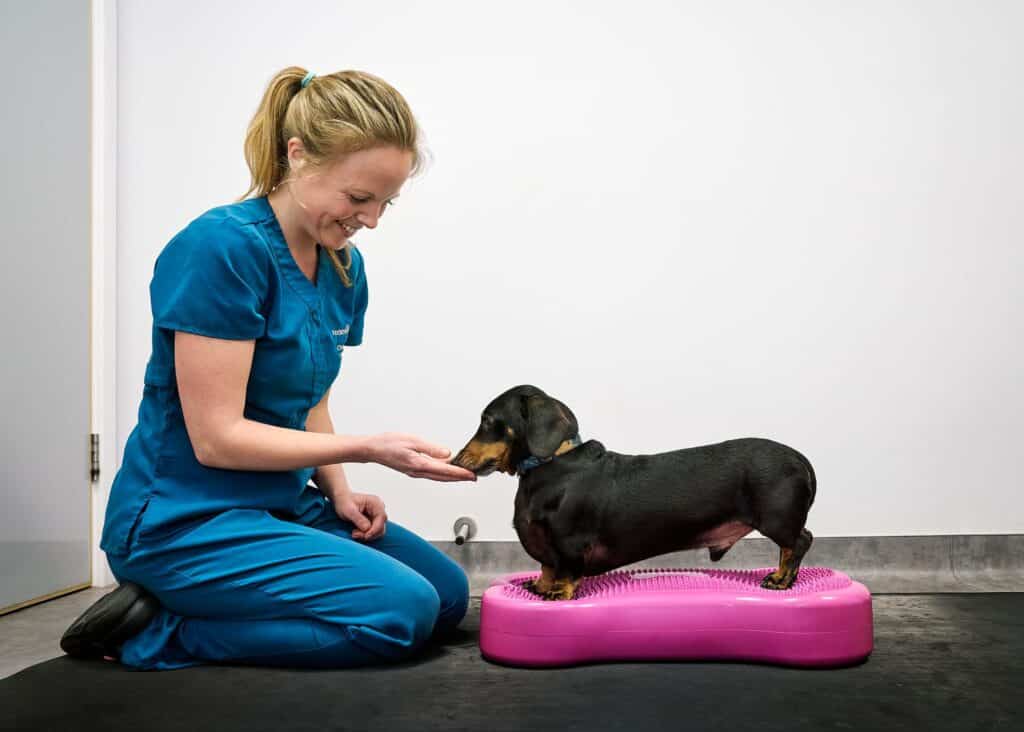
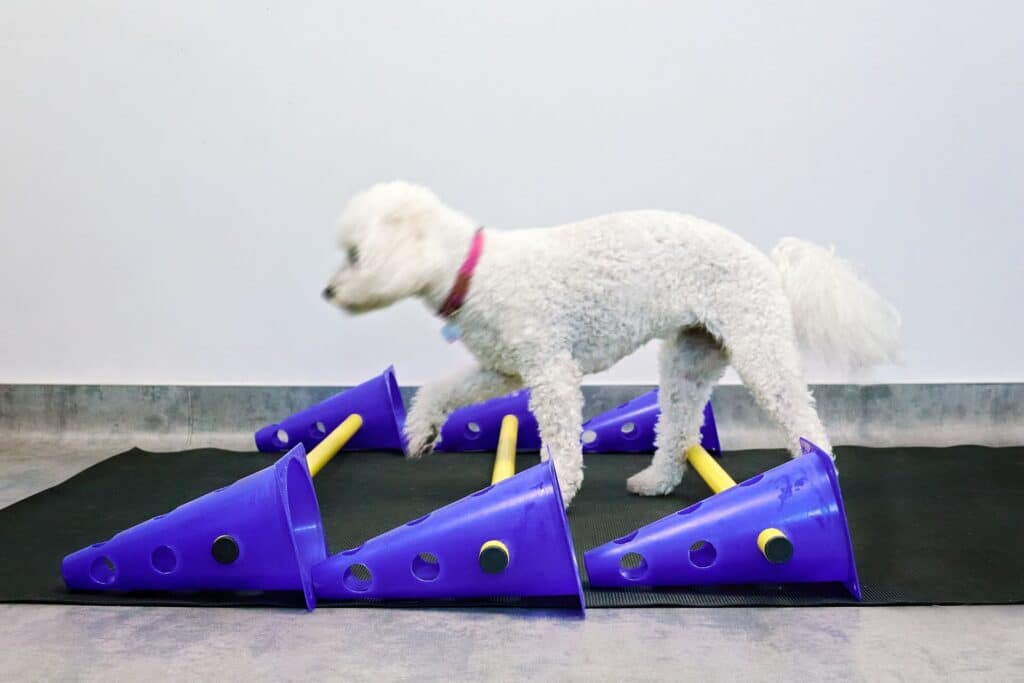
You can see our team if your primary care vet refers you to us, you don’t need to see one of our clinicians first.
Physiotherapy is part of the veterinary care your pet can receive, but it is not a substitute for the right treatment. Veterinary physiotherapy is all about helping your pet live life to the full and allowing them to do all the activities you enjoy sharing together. If you feel your pet would benefit from physiotherapy treatment, please speak to your vet about referring them to us.
Treatments we offer:
- Manual therapies – e.g. massage, stretching, joint mobilisations etc.
- Rehabilitation Exercises
- Electrotherapies – TENS, Therapeutic Ultrasound, Laser, Pulsed electromagnetic field therapy (PEMF), NMES
- Management Advice
We have also added the SpectraVET Pro2 laser unit to the services we provide for patients
To find out more about non-invasive and painless laser therapy, please click here.
Prices
Physiotherapy
Initial consultation: £95
Follow-up: £95
Laser Package
Course of 10 sessions
(15 minutes per session)
£486
Physiotherapy Package
Initial consultation + 5 follow-up consultations
£500
FAQ
Your pet may be worried the first time they visit, but everything will be carried out at a pace your pet is comfortable with. The majority of pets soon learn that having physiotherapy is a very different experience to most veterinary treatments. Also, because most of the treatments encourage the release of endorphins, the ‘feel good’ chemicals, they quickly learn to associate this feeling with their physiotherapy treatment.
To make your pets experience a positive one, we always advise bringing your pets favourite food and a blanket from home.
Yes! Please give all prescribed medication to your pet as you normally would prior to any physiotherapy treatments.
Following referral by your veterinary surgeon for physiotherapy, your pet will be booked in for an assessment. Each appointment will last around an hour.
A lot of pets do very well with weekly appointments initially. However, some pets will need more intensive treatment, so may need to be seen more regularly. As your pet improves, the frequency of appointments may be reduced and some pets will not need ongoing treatment once the problem has resolved. However, those with more chronic conditions may need ongoing, regular treatment to keep them mobile and comfortable.
Your pet may be quite tired and a little stiff after their treatment, but this should pass quickly. You might also notice they drink a little more than normal. This is the body’s way of flushing out waste products following treatment and is nothing to worry about. This should settle within 24 hours of treatment.
Some pets feel invigorated following treatment but it is important to follow the exercise guidance given by your veterinary physiotherapist to prevent them overdoing it in the early stages of recover.
We encourage owners to stay with their pets while they are receiving treatment as we strongly believe owners are an integral part of the rehabilitation team. Also, the veterinary physiotherapist will discuss and demonstrate a range of things you can do at home to aid the rehabilitation of your pet.
